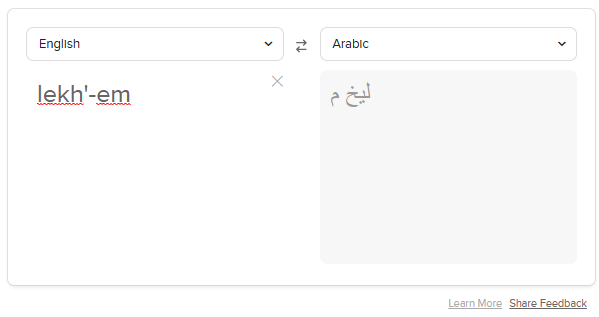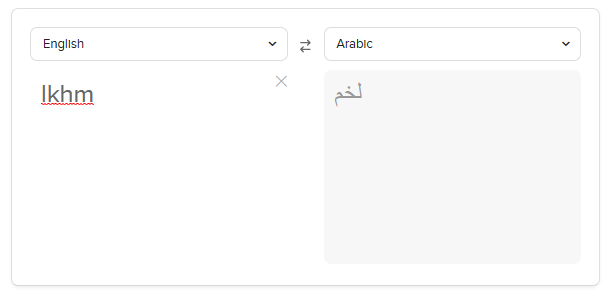Ἰησοῦ Ναζαρηνέ in Mark 1:24 is pronounced as Iēsou Nazarene. 'Jeshu' and 'Issa', which are entirely different names in their original Arabic. Jesus (pronounced /'dzi:zǝs/) is a transliteration based on the Latin lesus originating in the Greek Inooûç (lēsoûs), itself a Hellenisation of the Hebrew Yēšûǎ' or Hebrew-Aramaic Yěhōšuǎ', meaning Yahweh delivers or Yahweh rescues. The Arabic form of this name is for which the transliteration is yisü'. ‘Īsā is based on an entirely different root, one common to the Hebrew name Esau (pronounced /'i:s:/) (Hebrew Esav, Tiberian Hebrew 'Ēśaw; Greek: Hoau). Esau is a Hebrew male name best known as that of the fraternal twin of Jacob / Yaqub the patriarch.
Mark 1:24
24 λέγων, Τί ἡμῖν καὶ σοί, Ἰησοῦ Ναζαρηνέ; ἦλθες ἀπολέσαι ἡμᾶς;c οἶδά σε τίς εἶ, ὁ ἅγιος τοῦ θεοῦ
Iēsou Nazarene = Yasu Nasraniy = Jesus the Nazarene / Jesus of Nazareth
Ἰησοῦ Ναζαρηνέ means يسوع الناصري in Arabic. This translates to Yasu the Nazarene, and states that Yasu himself was a Nazarene, while factually the Quran never states that ‘Īsā was a Nazarene, there are many Christians today who still use the name Nazarene. ‘Īsā and Jesus are both spelt different in Arabic, Jesus is يسوع in Arabic and ‘Īsā is عيسى in Arabic, both are completely different spellings while Jesus is directly a Nazarene himself but Isa is never addressed as Nazarene.
 |
| Legōn Ti hēmin kai soi Iēsou Nazarēne |
What the Quran says about Issa and Nasara
فَلَمَّآ أَحَسَّ عِيسَىٰ مِنْهُمُ ٱلْكُفْرَ قَالَ مَنْ أَنصَارِىٓ إِلَى ٱللَّـهِ قَالَ ٱلْحَوَارِيُّونَ نَحْنُ أَنصَارُ ٱللَّـهِ ءَامَنَّا بِٱللَّـهِ وَٱشْهَدْ بِأَنَّا مُسْلِمُونَ
But when Jesus perceived their denial, he said: “Who are my helpers for God?” The disciples said: “We are the helpers of God; we believe in God; and bear thou witness that we are submitting.” (3:52)
The Quran here states that Issa says "my helpers for God", and never calls himself a helper, since he is obviously the Messenger for God, the word used here for helpers is أَنصَارُ (ansaar) which is the plural of نَصِير (helper), other verses state the word وَٱلنَّصَـٰرَىٰ (Nazarenes) which is plural for نَصْرَانِيّ (Nazarene) which is cognate to the Greek word Ναζαρηνέ (Nazarene), and has the same arabic root as نَصِير which is ن ص ر, while the word نَصْرَانِيّ means Nazarene in reference to an institutionalized group calling themselves نَصْرَانِيّ (Nazarene), which still exists today, for example, a group of people in Kerala, India, who call themselves نَصْرَانِيّ rather than مسيحي (Massihiy) which means Messianic or Christian, where مسيح (Massih) means anointed the same as Greek term Χρίστος (Christos) which means anointed , in Islam we are not supposed to name ourselves after the Prophets, yet many have done so such as the Christians who have named themselves after Christ (Messiah). As stated in Mark 1:24, Yasu (Yeshua/Jesus) is called a نَصْرَانِيّ (Greek cognate: Ναζαρηνέ). The same Quran verse states that the أَنصَارُ (ansaar) are ٱلْحَوَارِيُّونَ (al ḥawāriyyūn) of Issa, ٱلْحَوَارِيُّونَ means disciples, apostles, etc. And حَوَارِيّ is singular form of ٱلْحَوَارِيُّونَ, and means disciple, apostle, etc, in the singular. حَوَارِيُّون (ḥawāriyyūn), حَوَارِيّ (ḥawāriy) and Ge'ez ሐዋርያ (ḥäwarəya, “traveller; messenger, envoy; apostle”) are cognates, while absent from Syriac, the Ge'ez language is a South Semitic language. Muhammad Asad comments here: Al-ḥawāriyyūn (sing. hawari) is the designation applied in the Qur’an to the disciples of Jesus. […]and the evidence provided by the recently discovered Dead Sea Scrolls strongly supports this view - that the term hawari was popularly used to denote a member of the Essene Brotherhood, a Jewish religious group which existed in Palestine at the time of Jesus, and to which, possibly, he himself belonged. The Essenes were distinguished by their strong insistence on moral purity and unselfish conduct, and always wore white garments as the outward mark of their convictions; and this would satisfactorily explain the name given to them. Asad holds to the dominant Egypt-Palestine thesis and the Judeo-Christian extension thereof. The Essenes were a sect which carried the teachings of the original Issa, a Messenger of God who predated Yasu Nasraniy (Jesus Nazarene) by centuries and was active in Arabia. The Essenes according to archeological records of their sect found in Qumran caves demonstrate that they already existed a century prior to the common era when Jesus is said to have lived. Certainly, the names Issa and Essene bear an easy comparison, In Northern India, Christians call themselves Isaai (Hindi: ईसाई, Urdu: عیسائی), the عیسائی (Isaai) is cognate to the Greek Ἐσσαῖοι (Essaioi) which means a follower of Issa, Essene derives from Greek Ἐσσαῖοι (Essaioi)

The Greek Ἐσσαῖοι (Essaioi) is عیسی (Issa) according to the translation above, though the proper rendering should be عیسائی (Isaai) as Hindi and Urdu has evidential influence from Arabic, despite the fact that it does show a remarkable correlation between the Greek name for the group called Essenes and the name عیسی (Issa), by translating Ἐσσαῖοι (Essaioi) as nothing but عیسی (Issa) the name of the Son of Maryam in the Quran. An inscription from ancient southern arabia, prior to the Prophet Muhammad shows that the name عیسی (Issa) in Arabic was already being inscribed using ancient writing systems of Arabia prior to the popular rise of the Hijazi and Kufic scripts, and the fact that Essaioi is literally a cognate to عیسائی (Isaai) and Ἐσσαῖοι (Essaioi), عیسی (Issa) was being worshipped like the Quran states and objects, the Ἐσσαῖοι (Essaioi) also fell prey to the shirk of worshipping a human Messenger, and this group predated يسوع (Yasu) also known as Jesus. Now, why would the Ἐσσαῖοι (Essaioi) be named after Jesus if Jesus came later? Is it because Issa and Jesus actually aren't the same person? Is it because Issa lived prior to Jesus and some of Issa's followers created the Essene group?... Issa mentioned in Musnad inscription (not necessarily the prophet):

𐩲𐩺𐩪𐩥 - This name is to be read from right-to-left, this name transliterated in Arabic script is عيسو, the name is spelt with و since the musnad equivalent for alif maqsura ى didn't exist, musnad equivalent to و was used, though the proper way to pronounce the name is Issa and not Esau, as the و is silent in some words and used as a substitute letter for alif maqsura ى. For example, the word Salat is sometimes spelt with a و or with a ى in arabic, yet pronounced the same.
Paul conflated three personalities to form his new theology: Īsā (the original prophet of God who had lived in Arabia and about whom some residual knowledge was held by Arabian Jews), Jesus (Yeshua), a political rebel recently killed at Jerusalem, and the Christ of Paul's own imagination - one which owed much to pagan concepts taken from Greek and Roman thought.
At first, the followers of Jesus - whose master had died barely ten years previous - attacked Paul's manipulations. But some three centuries later Paul's religion received the backing of Rome and his invention became the foundation for the orthodoxy of the Roman Church.
The prophet about which the Qur'an speaks - 'Īsā, son of a woman called Maryam had been sent as a messenger to the children of Israel centuries before the personality called Yeshua entered Palestine, a place with which Īsǎ was entirely unconnected.
According to the Qur'anic narrative, Īsā was born under a ripe date-palm- a genuine possibility in late summer in Arabia - and was the man to whom God revealed the Injil (or Gospel). The works extant under that name which today participate in the Christian Canon contain some part of the original story and message of the prophet 'Īsā, although in garbled and corrupted form and ascribed to Jesus (Yeshua).
Issa or Yasu is said to be born in Bethlehem, this is Bayt Lakhm in Arabic, and Lakhm is literally the name of Banu Lakhm who are from Dhibin in Yemen.
Bethlehem
Strong's Concordance
Hebrew: בֵּית לֶחֶם
Transliteration: Beth Lechem
Phonetic Spelling: (bayth leh'-khem)
NAS Exhaustive Concordance
Word Origin: from bayith and lechem
Lechem/Lacham (leh'-khem)
The triliteral root without the vowels
Al-Muhit fi al-Lugha (Al-Sahib ibn Abbad - C. 995 CE.)
لخم
لَخْم: حَي من اليَمَن
Translation: Lakhm: A neighborhood of Yemen.
Bayith
Hebrew: בּיִת
Transliteration: bayith
Phonetic Spelling: (bah'-yith)
Definition: a house
Translation in Arabic: بيت
The Lakhmid dynasty (Arabic: اللخميون, romanized: al-Laḫmiyyūn), referred to in Arabic as al-Manādhirah (المناذرة, romanized as: al-Manāḏira) or Banu Lakhm (بنو لخم, romanized as: Banū Laḫm), was an Arab kingdom in Southern Iraq and Eastern Arabia. The Lakhmid Kingdom was founded and ruled by the Banu Lakhm tribe that emigrated from Yemen in the second century. Ibn Barrajān states that the native soil of Banu Lakhm is Dhibin in Yemen.
Al-Muhkam wa al-Muhit al-A'zam (Ibn Sīdah'l-Mursī - C. 1066 CE.)
ولَخْم: حيّ من الْيمن
Translation: Lakhm: A neighborhood of Yemen.
Bethlehem is generally translated to بيت لحم (Bayt Laḥam) in Arabic, though the phonetic spelling and transliteration of the Hebrew בֵּית לֶחֶם is "bayth leh'-khem" and "Beth Lechem" even though the actual word is spelt with a Ḥeth (ח) in Modern-day Hebrew which is equivalent to ḥāʾ (ح) in Arabic, however, the tendency to vocalize the ḥāʾ (ح) sound as ḫāʾ (خ) was very evident in Yemen. This phenomenon can be observed even today, in Hebrew which explains why the term Ḥizbullah is often pronounced Khizbullah (romanized: Ḫizbullah) by Hebrew speakers, and the fact that the phonetic spelling of לֶחֶם is with Ḫeth (Kheth) not Ḥeth, additionally, the Ḥeth (ח) in לֶחֶם has diacritics which indicates that it must be vocalized as ḫāʾ and not ḥāʾ.

For three centuries, the Lakhmid Kingdom- or al-Manadhirah, in Arabic- was ruled by the Banu Lakhm Dynasty. ‘Amr ibn Adi, the dynasty’s founder, is a descendant of the Lakhm tribe that originated from Qahtani Yemen. This is mentioned in the 3rd century Paikuli inscription’s description of the Sasanian Empire, to which the Lakhmid Kingdom was a vassal state. Before being annexed by the Sasanian Empire, the Lakhmid Kingdom extended from Saudi Arabia to the south of modern-day Iraq, with the ancient city of al-Hirah as its capital. The Lakhmid Kingdom served as an influential region for Nestorian Christianity throughout its reign.
Lastly, there is no correct or incorrect way of pronouncing Bethlehem/Bayt-Lakhm, but when you add diacritics to Heth, then it indicates it's a Kheth, the same rule is literally in Arabic, like the difference between ح and خ is that the latter is just ح with dotted diacritic indicating it's supposed to be pronounced as kha and not ha. The Bible in Hebrew is literally spelling it with a Kheth, as it's got diacritics. The three dots underneath the Heth which makes it a Kheth, same rule is applied in Arabic, like Ayn and Ghayn (ع and غ).









Comments
Post a Comment